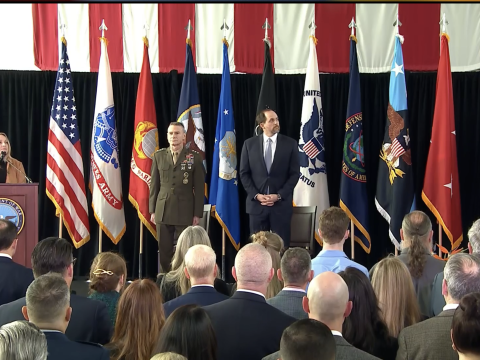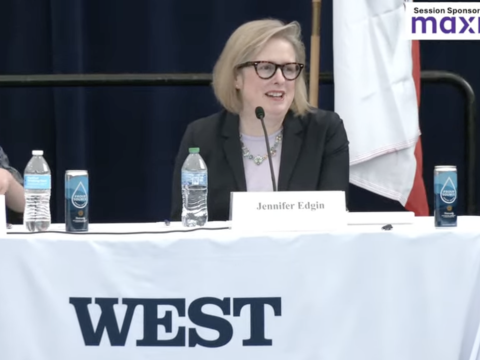China Coming On Strong in Space
While the United States currently holds an edge on space capabilities, China is rapidly catching up, according to Christopher Scolese, director of the National Reconnaissance Office. Scolese spoke on the second day of the Intelligence & National Security Summit, which included top leaders from the FBI, CIA, NSA and other agencies, who addressed new threats and AI challenges.
Scolese discussed the Russian and Chinese threats in space. “They are very capable countries, technologically smart. They're economically strong, and they're developing capabilities across the spectrum of systems, and they're competing with us,” he said. “We are, right now, the strongest capability in space. But China is coming out strong, so that represents an additional threat to what we're doing.”
But the National Reconnaissance Office continues to innovate and diversify. “From last June, roughly, until the end of this calendar year, we’ll have launched more than 100 satellites.”
Vice Adm. Frank Whitworth, USN, director of the National Geospatial-Intelligence Agency, said his agency is a leader in innovative technologies.
“I’m really proud of the fact that we’ve been leading the way," he said in response to a question from Julian Barnes, New York Times reporter and panel moderator, about the respective agencies’ goals in adopting new technologies, including artificial intelligence. “We’re constantly evolving, ensuring that responsible tenants of artificial intelligence are being applied effectively.”
David S. Cohen, deputy director of the CIA, said that generative AI is very useful in sifting through too much information in an effective way. “I think this is the area where we have a tremendous opportunity because we have the ability to leverage the models that are trained on open-source information that everybody, including our adversaries, have access to.”
Adm. Whitworth encouraged a “realistic” approach to artificial intelligence rather than an “idealistic” one. “I think the debate over AI that we're starting to move into is very similar to the debate we had in nuclear disarmament and deterrence with idealists and realists. Idealists might have you think it’s going to be perfect,” he said. “When we start talking about generative AI, I think what you're going to see is, from a community perspective, a collaboration with how we learn those tools in a way that allows us to be more community-wide.”
Paul Abbate, deputy director of the FBI, explained that AI has allowed less sophisticated criminal actors to enter the space. “It’s increased the numbers of those out there that are engaging with criminal activities. It's involved those who are already engaging it to increase their level.”
But the FBI continues to work to protect people, organizations, companies and the government from being victimized. “In the unfortunate instances where the adversary, the criminal, does achieve the goal, we're going to go after him, hunt him down and attempt to bring justice,” Abbate said.
The conversation moved to Iran's support of Hamas in their war against Israel. “The terrorist attack by Hamas was fueled by years of support from Iran,” said Cohen. “Iran is broadly interested in continuing to keep the pressure on Israel.”
Gen. Timothy D. Haugh, USAF, commander and director of the National Security Agency and U.S. Cyber Command, clarified that the U.S. focus in the Israel war is support to Israel. The second focus is protecting U.S. forces in the region. “We’ve got to make sure that we collect force protection as our focus within the region. Third is ensuring that all our allies in the region have a clear understanding of the threat.”
Earlier this month, four individuals were arrested in Austria, Vienna, with the intention of bombing a Taylor Swift concert. “They were found with explosives,” said Cohen. “The Austrians were able to make those arrests because the agency and our partners in the intelligence community provided them information.”
Cohen described this as a big success. “And not just for the Swifties.”
Terrorism continues to be a threat. “Some have said wrongly that the terrorism threat has diminished or faded over time,” said Abbate. “From what we see, that’s not true in any way or shape. It’s remaining persistent and consistent and significantly elevated again.”
He said the FBI and Department of Justice speak every day about counterterrorism efforts. “We just need to stay focused.”




Comments